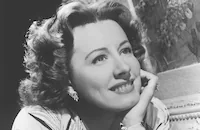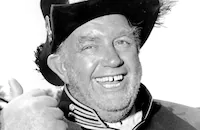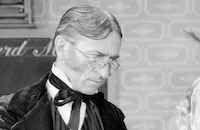Never a Dull Moment

Brief Synopsis
Cast & Crew
George Marshall
Irene Dunne
Fred Macmurray
William Demarest
Andy Devine
Gigi Perreau
Film Details
Technical Specs

Synopsis
When cowboy Chris Heyward sees sophisticated Broadway songwriter Kay Kingsley during a benefit rodeo in New York City, he is immediately attracted to her. Friend and fellow rodeo rider Orvie pushes the reluctant Chris, who is a widower, into Kay's arms, and after a whirlwind romance, the two are married. The newlyweds then drive across country to Chris's Wyoming ranch, the Cougar Rock, where they are greeted by Chris's young daughters, Nan and Tina. They also encounter their more prosperous but cantankerous neighbor Mears, who controls Chris's water rights. No sooner does the exhausted couple settle in for the night, than they are dragged out of bed by boisterous well-wishers, anxious for a shivaree. Organizing the shivaree is Jean Morrow, a widowed rancher who, until Kay, was Chris's romantic interest. Jean welcomes Kay without jealousy, however, and the shivaree is a great success until Kay cajoles Mears into dancing with her. An inexperienced dancer, Mears slips and falls into a piece of pie and roars out of the party, humiliated. Later, after only two hours of sleep, Kay and Chris are reawakened by Chris's chatty friends, who insist that the groom join them on a cougar hunt. At five, Kay is again stirred from her sleep by Nan and Tina. The children, who are wary of their new stepmother, inform Kay about all the ranch chores and then watch in horror as she dutifully but ineptly tries to accomplish them. Kay's uncomplaining perseverance soon wins the children over, but despite their support, Kay is overwhelmed by the day's work and fires their Indian cook for trying on her clothes. When Chris then returns with a dead cougar, asking that Kay cook dinner for his friends, Kay collapses in tears. Four months later, Kay is still struggling with her domestic chores when a windstorm hits, threatening to blow away the interior of her house. In the midst of the chaos, Jed, her former collaborator, arrives and offers her a job writing a new show with him in New York. Tempted by the promise of easy money, with which she hopes to buy a water-rich ranch, Kay accepts Jed's deal. When Chris returns that night, exhausted from a hard day's work, however, Kay is unable to break the news and informs Jed that she has changed her mind. Soon after, Chris learns that the ranch's only source of water has dried up and determines to confront Mears about it. Before he does, Kay tricks Mears into agreeing to give them more water by threatening to sell the Cougar Rock to a neighboring dude ranch. Unaware of what his wife has done, Chris makes his demands, and is startled when Mears agrees to his terms without a fight. Elated by his apparent victory, Chris invites Kay to join his hunting group that night, but abandons her in the camp the next morning. As Kay angrily prepares breakfast for the men, she hears what she believes is a cougar in the bushes and shoots it. To her and Chris's dismay, her target was actually Mears's prize steer. Kay's error costs the ranch Mears's water, and soon she and Chris are arguing about their future together. When Chris refuses to allow Kay to buy a new ranch by composing a show, she leaves for New York by herself. While Chris returns to the rodeo circuit, Kay works with Jed, but finds she can only write songs with western themes. Eventually, Orvie, Tina and Nan force Chris to go see Kay and admit that he still loves and needs her. After she admits the same, the newlyweds are happily reunited.

Director

George Marshall
Cast

Irene Dunne

Fred Macmurray

William Demarest

Andy Devine

Gigi Perreau

Natalie Wood

Philip Ober
Jack Kirkwood

Ann Doran
Margaret Gibson
Lela Bliss

Irving Bacon

Gene Evans

Olin Howlin
Paul Newlan
Anne O'neal

Chester Conklin
Ralph Peters
Janine Perreau
Jim Hawkins
Jack Jackson
Alan Dinehard Iii

Jo Ann Marlowe
Bob Thom
Carl Sklover
Art Dupuis
Jacqueline De Witt
George Leigh
Harry Tyler
Victoria Horne
Connie Van
Virginia Mullen
Edna Holland
Sherman Sanders

Dan White
Crew
Doris Anderson
C. Bakaleinikoff
Travis Banton
Fred Bentley
Mel Berns
Lou Breslow
Phil Brigandi
John Burch
Shorty Burton
James Casey
Albert S. D'agostino
Stephanie Garland
Larry Germain
George Hager
Frederick Hollander
Walter E. Keller
Dick Kinon
Gaston Longet
Jack Mills
Harriet Parsons
Fred Phillips
Clem Portman
Darrell Silvera
Clifford Stine
Kay Swift
Robert Swink
Joseph Walker

Photo Collections
Film Details
Technical Specs

Articles
Never a Dull Moment (1950)
The scenario opens in New York, as Kay Kingsley (Dunne), successful and beloved show-tune scribe, holds court for the appreciative crowd she's drawn to a benefit rodeo thrown for Manhattan's impoverished kids. One of the most charmed in attendance is one of the cowpunchers, the recently widowed Chris Hayward (Fred MacMurray). Prodded by his insistent sidekick Orvie (Andy Devine), the nervous Chris manages to get a date for drinks out of the bemused songstress. Conveniently enough, things click so quickly that they're at the altar within two weeks, with Kay willingly pitching her lush Park Avenue existence for a life working Chris' modest and slightly dilapidated Wyoming spread.
Once there, Kay's personality lets her make relatively easy conquests of Chris's tomboyish pre-teen daughters, Nan (Natalie Wood) and Tina (Gigi Perreau), as well as Jean Morrow (Ann Doran), the attractive young widow whom the smart money was on receiving Chris's proposal. She likewise works her magic on the various locals, who have no trouble showing up at 2AM for a welcome celebration. Much tougher challenges come from the practical responsibilities of the ranch, which she tackles gamely if comically, and from Chris's crabby neighbor Mears (William Demarest), who has long wielded an iron fist over the much-needed water rights for the Hayward household. Mears' tyranny makes the overtures from Kay's erstwhile collaborator Jed (Philip Ober) to punch up his latest score all the more financially enticing, but Chris chafes at the prospect of having to be bailed out by her.
The goings-on were serviceably delivered by director George Marshall, whose copious credits included many memorable comedies, including the Fred MacMurray-headlined cult comedy Murder, He Says (1945). MacMurray offered up the expected pleasant romantic comic lead effort, and those boomers whose memories of William Demarest extend to watching him run a household alongside MacMurray on TV's My Three Sons may get some grins from seeing them at each other's throats here. The rest of the cast was in good form as well, from Devine in his patented sagebrush second-banana mode to the then-busy child stars Wood and Perreau.
Never a Dull Moment bears interest for its inspiration--Kay Swift, the eminent Broadway composer of the '30s, whose 1943 memoir served as the screenplay's basis. Swift also penned a trio of songs for the soundtrack, which now mark the final on-screen vocal performances for the operatically trained Dunne. Swift had been educated as a classicist, and was cajoled into composing popular music by George Gershwin. She became the first woman to write an entire Broadway score (1930's Fine and Dandy), and also became Gershwin's paramour over the last decade of his short life; until her passing in 1993 at age 96, she was regarded chief among authorities and interpreters of the composer's work. Her memoir, which focused on her 1939 whirlwind courtship and marriage to a rodeo cowboy named Faye Hubbard, was entitled Who Could Ask for Anything More?; apparently, one could, as their union ended in 1946.
Producer: Harriet Parsons
Director: George Marshall
Screenplay: Doris Anderson, Lou Breslow, Kay Swift (novel)
Cinematography: Joseph Walker
Film Editing: Robert Swink
Art Direction: Albert S. D'Agostino, Walter Keller
Music: Frederick Hollander
Cast: Irene Dunne (Kay Kingsley), Fred MacMurray (Chris Hayward), William Demarest (Mears), Gigi Perreau (Tina Hayward), Natalie Wood (Nancy Hayward).
BW-89m. Closed captioning.
by Jay S. Steinberg

Never a Dull Moment (1950)
Quotes
Trivia
Notes
The working title of this film was Come Share My Love. According to a January 1946 Los Angeles Examiner news item, Kay Swift's 1943 novel Who Could Ask for Anything More, on which this film was based, was inspired by her real-life marriage to rodeo star Kaye Hubbard. Swift met Hubbard at the New York World's Fair when he was performing in the rodeo and she was in charge of "light music." The couple, who lived on a ranch in Oregon as newlyweds, divorced in early January 1946, according to the item. In September 1945, Hollywood Reporter announced that Myrna Loy was to star in the picture as part of a new contract with RKO. Harriet Parsons was already lined up to produce under executive producer Jack Gross. After Loy dropped out, the project was apparently put on hold until late December 1946, when Hollywood Reporter again announced that Parsons was producing. Then, in March 1949, M-G-M contract star Ann Sothern was announced as the film's lead, but in May 1949, M-G-M rescinded its loan-out deal with RKO, according to Hollywood Reporter news items. RKO borrowed William Demarest from Paramount for the production. Although Variety and Box Office list the film's running time as 99 minutes, this length is probably an error.















